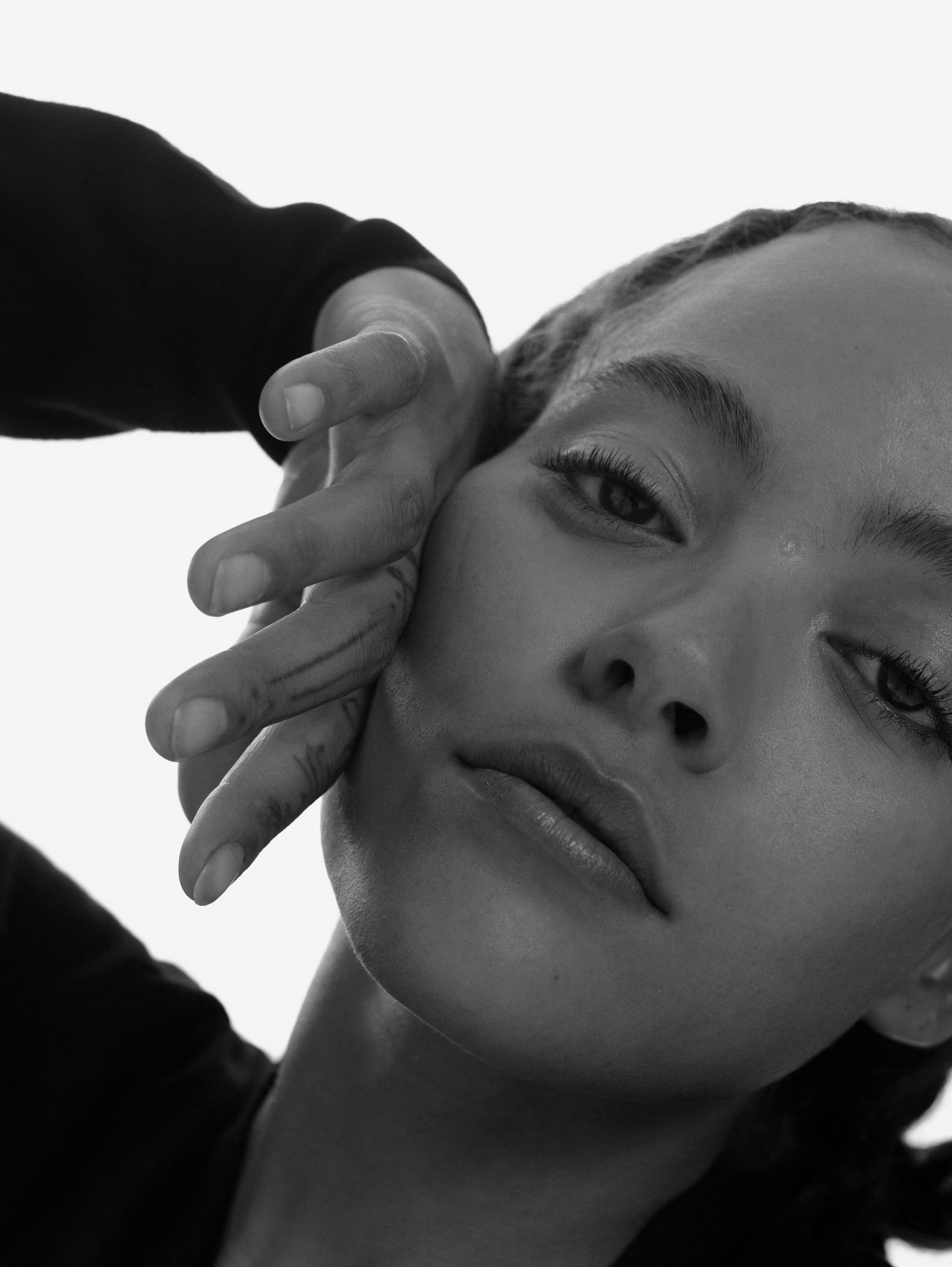
Vintage sweater by Burberry
Quintessa Swindell Reveals Their True Self
A smile spreads across Quintessa Swindell’s lips as they recall the uplifting conversation of the night before, setting the tone for a great day. Relaxed and laid back in a Nike t-shirt and messy bun, they are warm, open, and ready to engage, different from the more closed-off characters they have often portrayed on screen but still quiet and thoughtful enough to make it clear where the core characteristics of those roles came from. Swindell’s past work often revolved around the confusion of understanding oneself during late adolescence and keeping one’s true self hidden for safety—the exact opposite of how they show up in the real world.
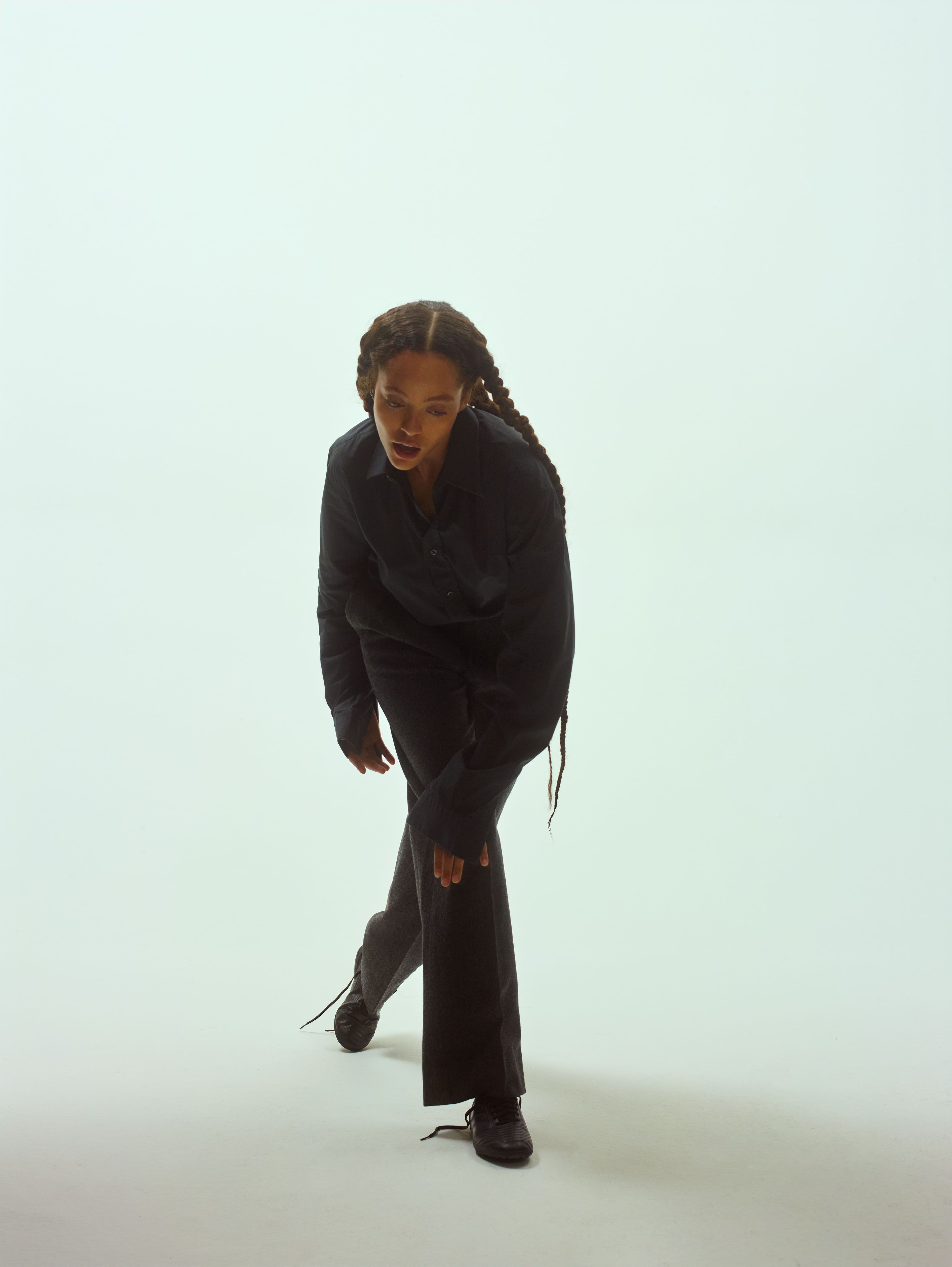
Vintage shirt by Hermès. Vintage pants by Saint Laurent. Vintage belt by Prada. Vintage sneakers by Adidas. All jewelry throughout, Swindell’s own.
Swindell is known for work such as Netflix’s teen drama Trinkets, HBO’s long-running and critically acclaimed series In Treatment, and the smash hit Euphoria. Their two latest projects, DC’s Black Adam and Paul Schrader’s highly anticipated festival favorite Master Gardener, will introduce them to a far wider audience. Opposite Dwayne Johnson in Black Adam, they play Cyclone, a member of the Justice Society of America who can control wind and generate sound. In Master Gardener, they play Maya, the great-niece of Sigourney Weaver’s Mrs. Haverhill who is taken on as the apprentice of the latter’s gardener, Narvel Roth, played by Joel Edgerton. When it is revealed that Narvel is a former hitman for a white supremacist group, the film questions if he can be redeemed after his past actions.
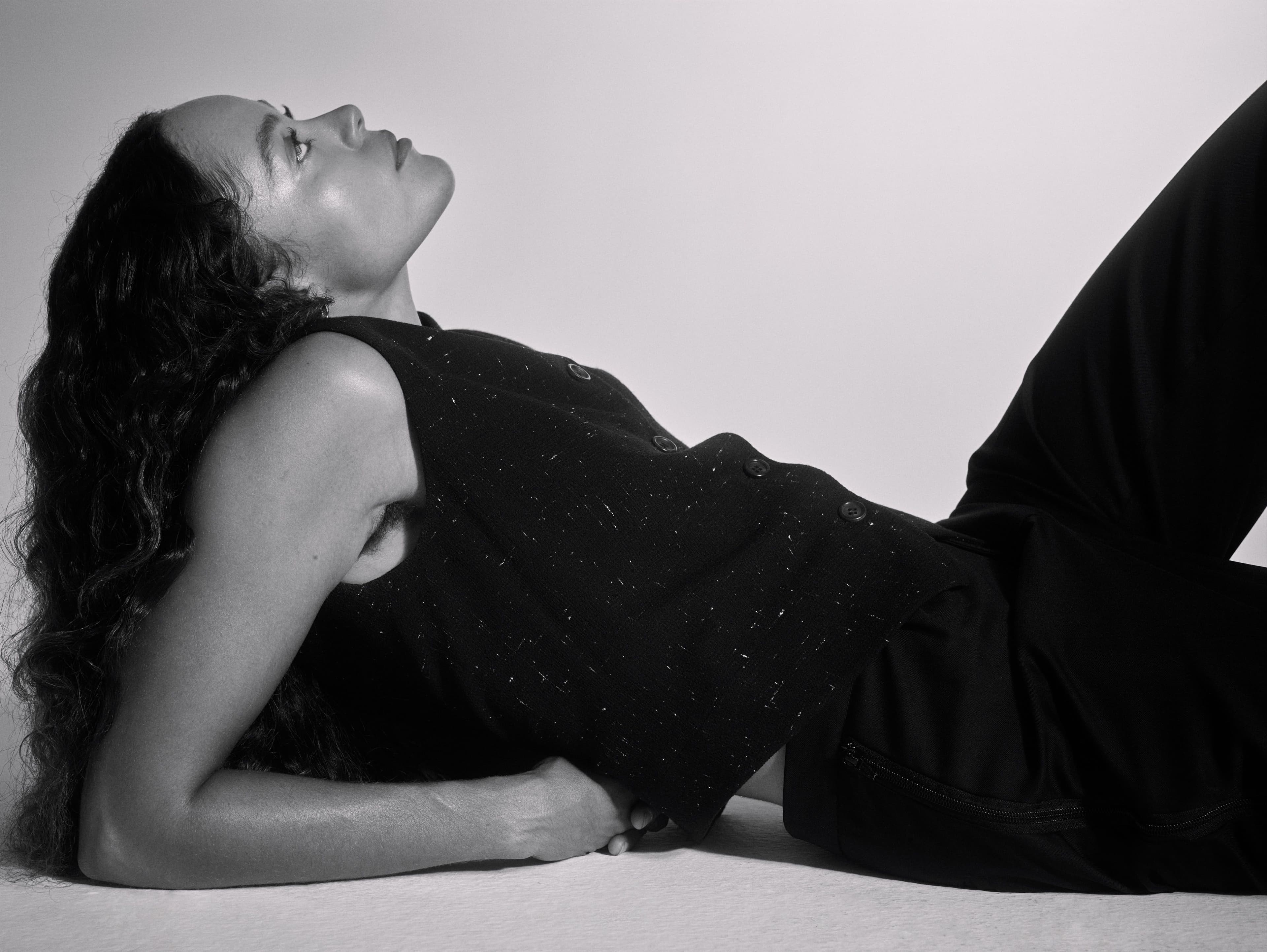
Vintage vest by Jil Sander. Vintage pants by Raf Simons.
Swindell considers themself lucky to have been part of several thrilling projects recently in which everyone involved was connected by the common goal of making great art. This emboldened the actors to have artistic freedom and give input when needed. “Everyone just couldn’t believe that they were doing it—the feeling of wanting to treasure the moment every day,“ they say. “There were days when I would have to get Covid-tested but I would just stay and didn’t have anything to do. I just wanted to be on set and in that environment because it was an incredible feeling.“
Their latest projects have taken on weighty questions of morality, justice, and identity as well. By following the journey of a man adorned with neo-Nazi tattoos and swastikas from a past life, Master Gardener asks which sins are too large to forgive and whether people can really be rehabilitated. Swindell says that what drew them to the film in the first place was a script that they didn’t completely align with but made them contemplate life. “I’m getting to the point where you can not agree with the premise or how something comes out but you can also enjoy the themes and tones,“ they add. “The important thing about film, whether it’s provocative or not, is to ask questions. I hope that doesn’t get lost.“ Audiences, they insist, must form their own opinions.
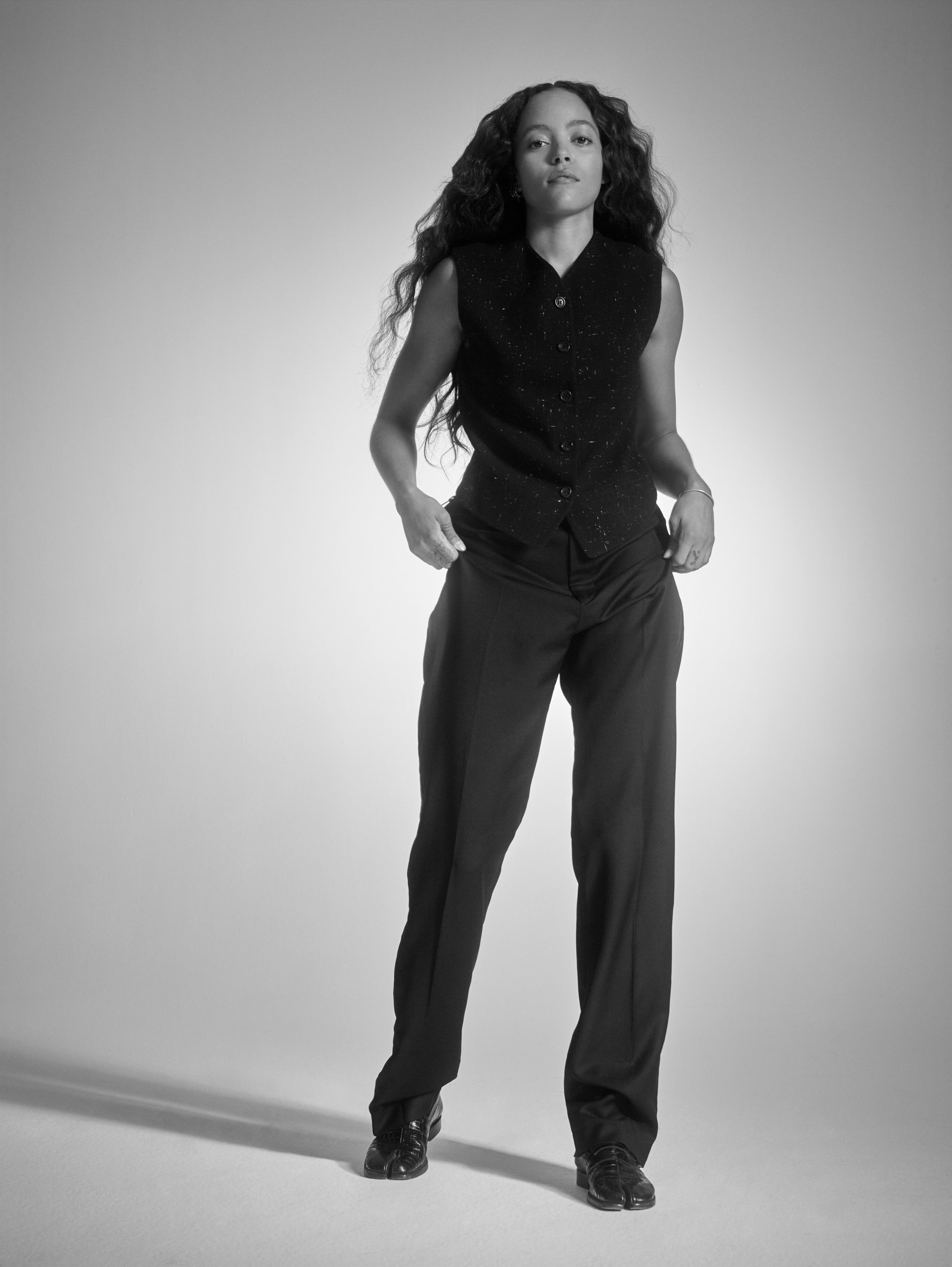
Vintage vest by Jil Sander. Vintage pants by Raf Simons. Shoes, Swindell’s own.
In order to delve into the interior lives of their characters, Swindell dedicates themself to physical preparation for every project. Months of reading Cyclone comics, for example, went into their character work for Black Adam. “I was looking at how she dressed. She has a witch hat and a green dress and red stockings,“ they recall. “The expressions that the artist drew for the character are wide-eyed, excited, and kind of timid. As soon as she steps into Cyclone, she’s fully free and all-encompassing. I was trying to figure out how that played physically and display that on camera.“
Cyclone’s physicality reminded Swindell of dance, and they took inspiration from the beautiful spins seen in Alvin Ailey’s choreography. “I wanted to add that playing Cyclone and being Black,“ they say. “[I asked,] ’How do we incorporate that Indigenous and African movement?’“ Dancers Isadora Duncan and Loie Fuller, who performed with swirling, colorful fabric on rods in some of their work, further inspired Cyclone’s tornado-like movement. Swindell also studied martial arts—as graceful as dance in their own way—and circus training for skills like trapeze and hooping to capture Cyclone’s acrobatic movements.
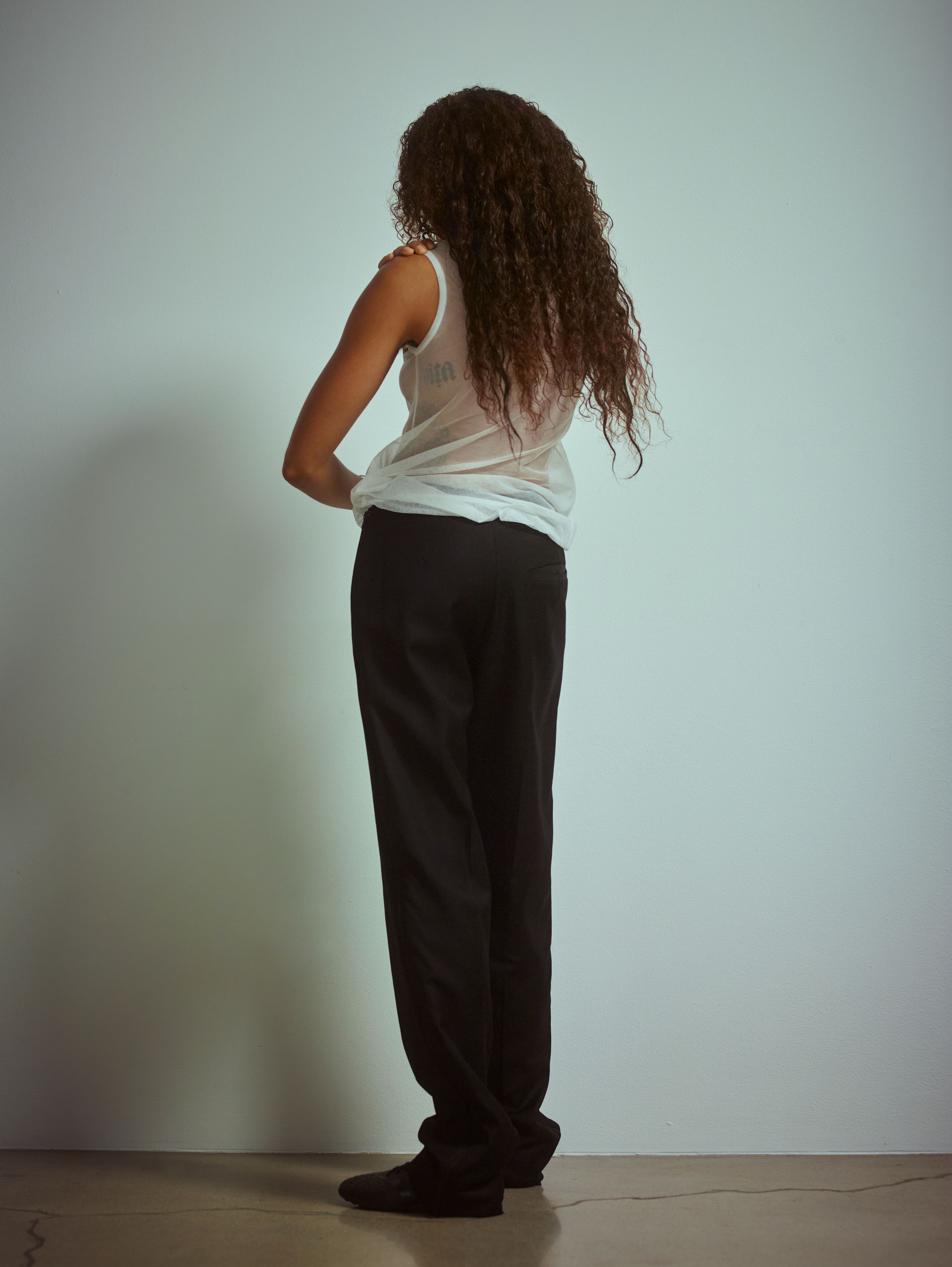
Vintage top by Helmut Lang. Vintage pants by Raf Simons. Vintage sneakers by Adidas.
The character of Cyclone has a long legacy in the history of DC Comics as the alter ego of Maxine Hunkel, who first appeared in 1996 as Red Tornado, an identity passed down to her from her grandmother and originally introduced in 1940. “We absolutely include the other versions—except for Cyclone being white,“ Swindell laughs. The actor’s work ethic and drive come not only from their love of the craft but also their acute awareness of what the industry expects and projects upon a relatively new actor who is also Black, trans, and non-binary. As someone still establishing their reputation who is also a part of multiple marginalized communities, there is the constant pressure to be twice as good. There are expectations that proceed one’s work and that are unfortunately their responsibility to dispel.
An effort to modernize Cyclone led to a character who questions the nuances of morality and does not always find a clear-cut answer. She comes from a legacy of noble superheroes, but throughout the film, what she’s been taught is tested as she understands more about the gray area between good and evil after meeting characters like Black Adam. By the end of the movie, Cyclone is left questioning these ideals.
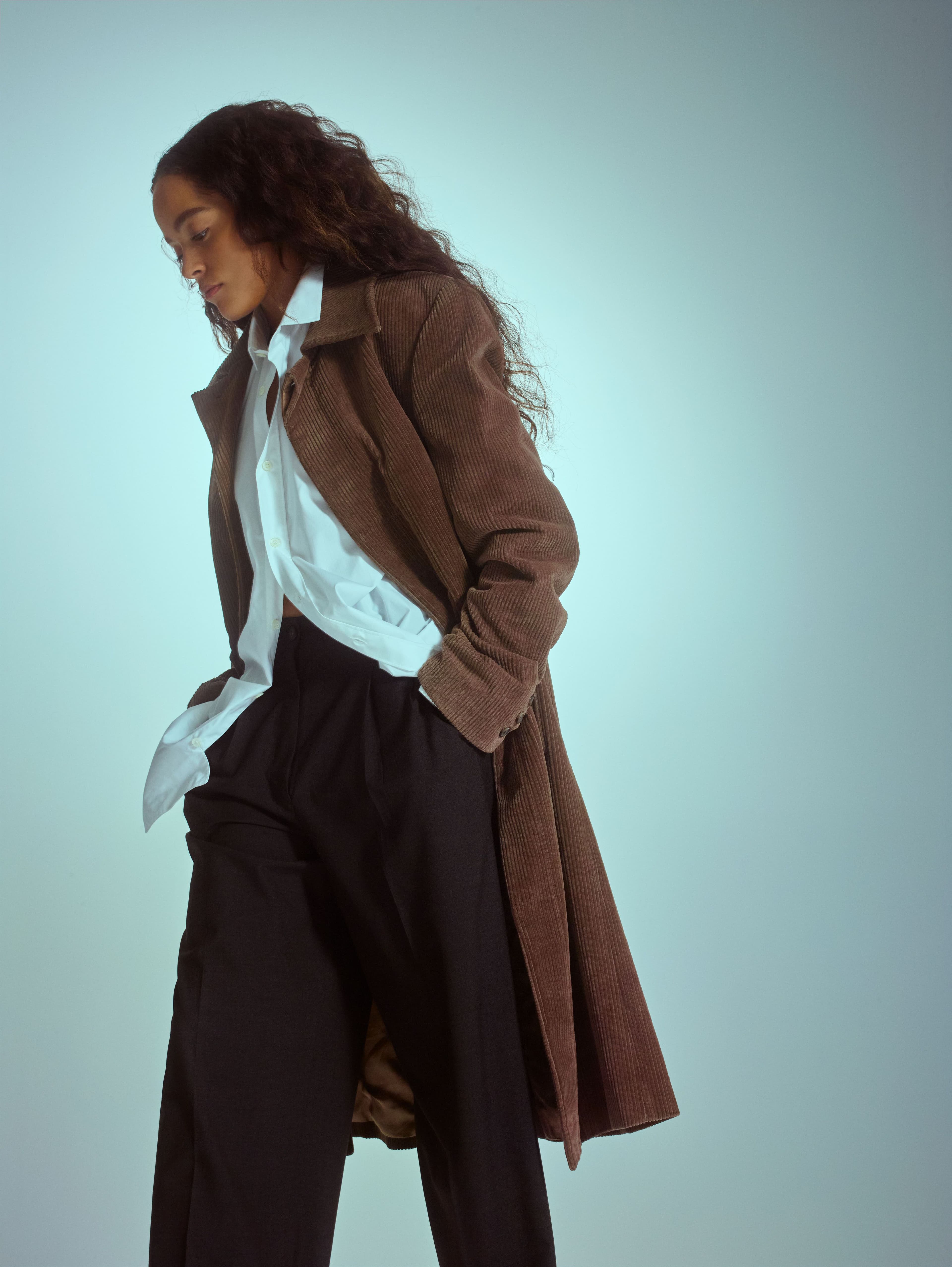
Vintage coat by Raf Simons. Vintage shirt by Saint Laurent. Vintage pants by Hermès.
Despite their recent positive experience on a blockbuster film, Swindell still has a soft spot for indie movies. “I really love scrappy things,“ they say, “things that are not too perfect, not too done up.“ However, their acting choices are ultimately not about the size of each project but its commentary and the way it is delivered. “I think that’s what makes both of those films so special and why I wanted to do them in the first place. They’re both saying something,“ they continue. “Black Adam is massive but it says something. Both are really beautiful in their own way and I love playing in both spaces.“
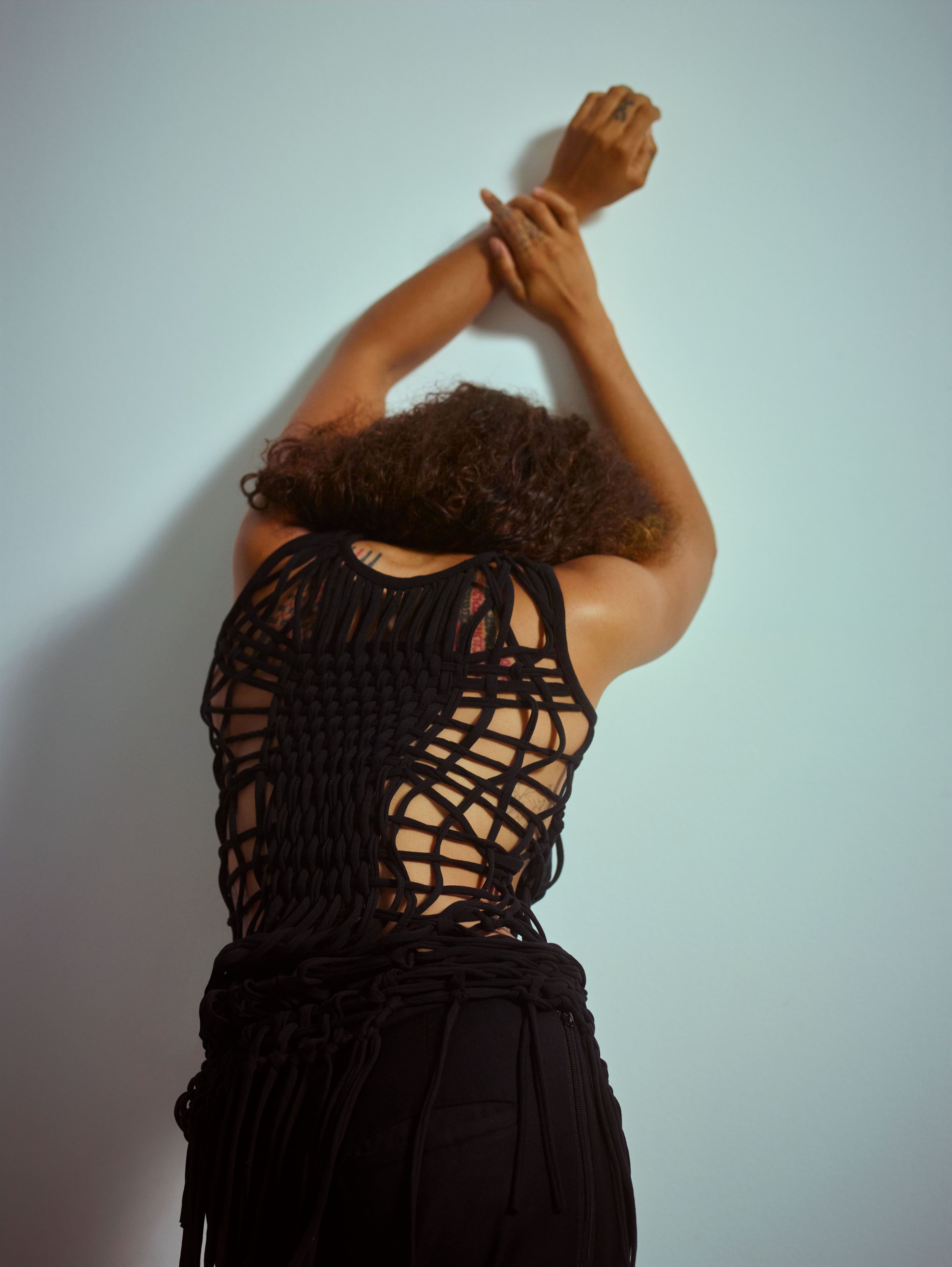
Vintage top by Jean Paul Gaultier. Vintage pants by Raf Simons.
Several themes emerge through conversation with Swindell: artistic freedom, community, and the liminal areas within art and life. They are interested in the big questions. As a Black and queer artist myself, the lens through which I see the world and how my output will be politicized impacts me as I work. Swindell is not afraid to be open about their artistic process or hopes, and how those connect to them as a person. It is evident that they sincerely enjoy the craft of acting but also want to improve the thing they love, and that they are taking it upon themselves to make that a reality. They also understand that there are exterior aspects that make that difficult, but that will never deter them from being comfortable in their own skin.
Throughout our conversation, Swindell brings up wanting to see change in Hollywood in how Black, female, trans, and queer people are cast and perceived. They point to the existing systems that can make it difficult to fully make the art that one wants. Hoping for that evolution to come sooner rather than later, they offer a quote from James Baldwin: “What is it you wanted me to reconcile myself to? I was born here, almost sixty years ago. I’m not going to live another sixty years. You always told me, ’It takes time.’ It’s taken my father’s time, my mother’s time, my uncle’s time, my brothers’ and my sisters’ time. How much time do you want for your progress?“
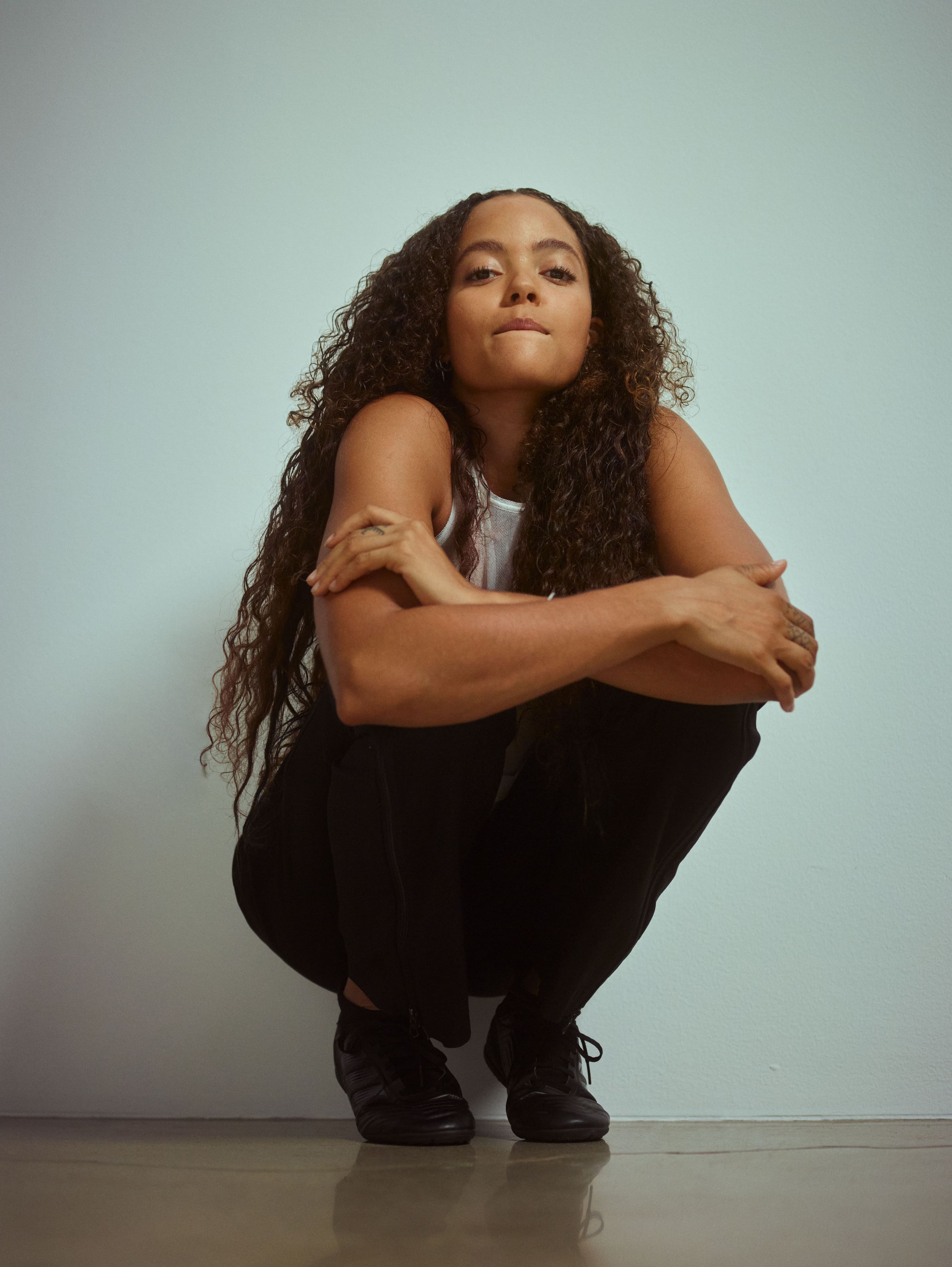
Vintage top by Helmut Lang. Vintage pants by Raf Simons. Vintage sneakers by Adidas.
When asked about Blackness, gender identity, queerness, and art, and how their intersection influences their work, Swindell becomes even more alive and animated, talking rapidly with their hands. They note their frustration with the current state of “nuanced“ female characters. They are critical about how non-binary actors must look androgynous to be cast as such and that trans actors must be desirable by cis people to be respected. After each point, they calm themself back down, offering a reminder that these impediments do not define them as an artist and that they must continue to prioritize connecting with like-minded people. “I believe it affects quite a bit, but I don’t focus on it too much because in the end, it’s all noise anyway,“ they say. “What grounds me is knowing that everything that comes my way is meant for me and the things that are not meant for me would not have served me.“
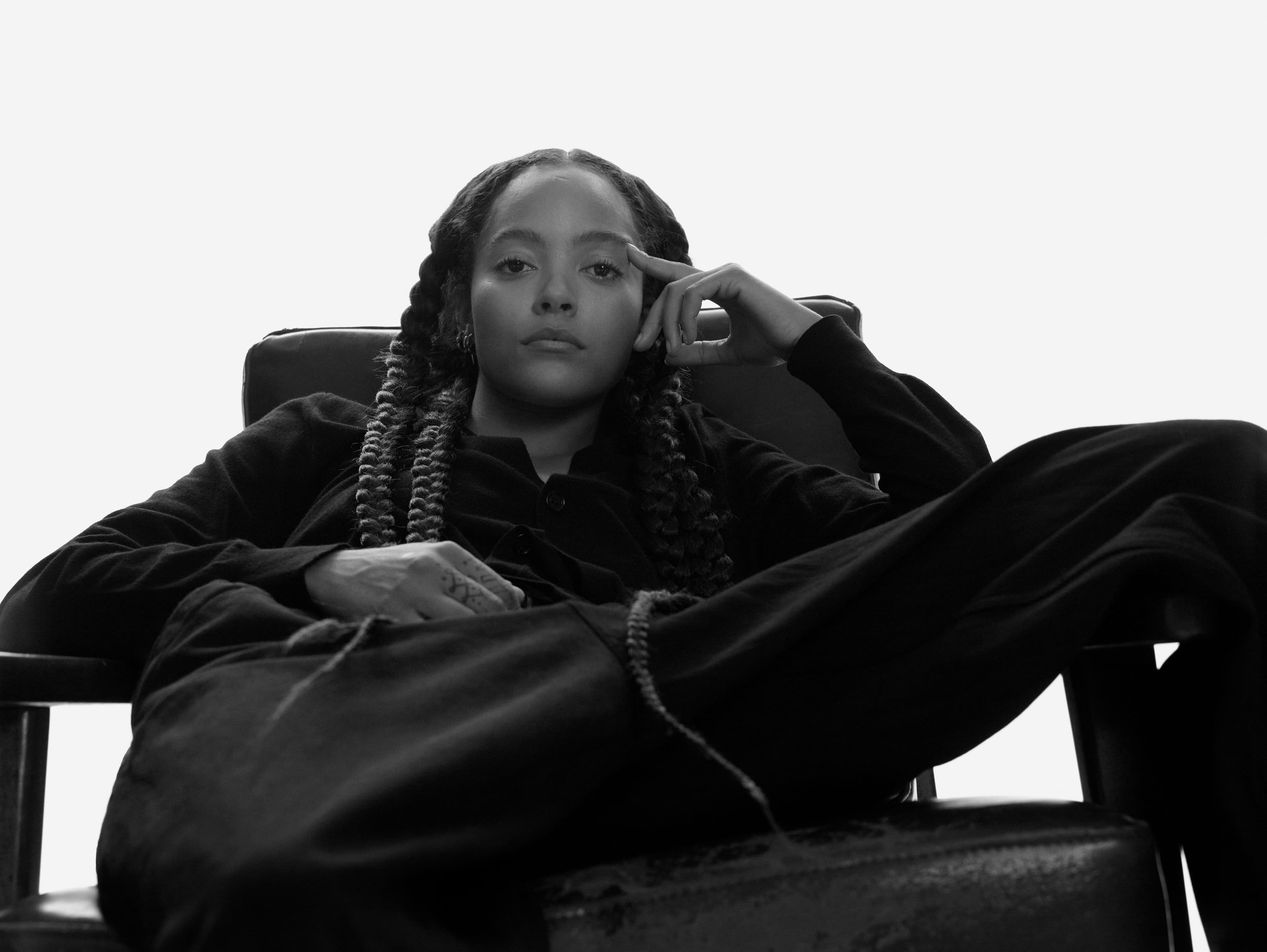
Vintage shirt by Hermès. Vintage pants by Yves Saint Laurent.
Swindell is focused on making that progress a reality and finding a way to do so while being completely, authentically themself. “The way I show up in the world gives me the strength to just simply show up for work,“ they add. “[It’s] sometimes difficult, other times liberating. No matter the identity of the character, it’s their voice that draws me in, their fight, their desire, their curiosity. I would love to diversify the characters I play, but there are larger systems in place that make that quite difficult. [I want] real tangible opportunity, no fluff.“
Black Adam is out now. Read this story and many more in print by preordering our fifth issue here.
As a nonprofit arts and culture publication dedicated to educating, inspiring, and uplifting creatives, Cero Magazine depends on your donations to create stories like these. Please support our work here.
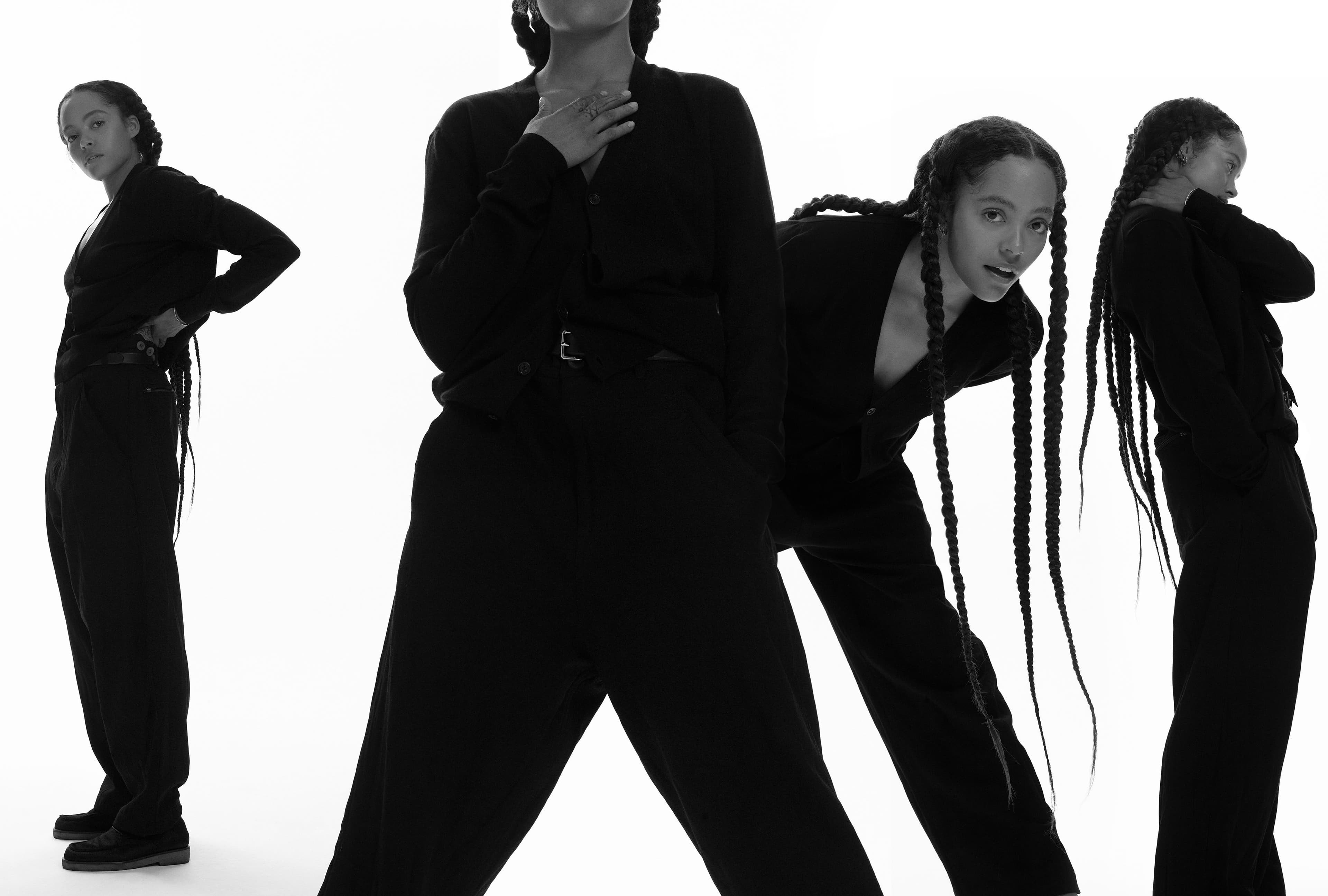
Vintage sweater by Burberry. Vintage pants by Comme des Garçons. Vintage belt by Prada. Vintage shoes by The Row.
As a nonprofit arts and culture publication dedicated to educating, inspiring, and uplifting creatives, Cero Magazine depends on your donations to create stories like these. Please support our work here.






